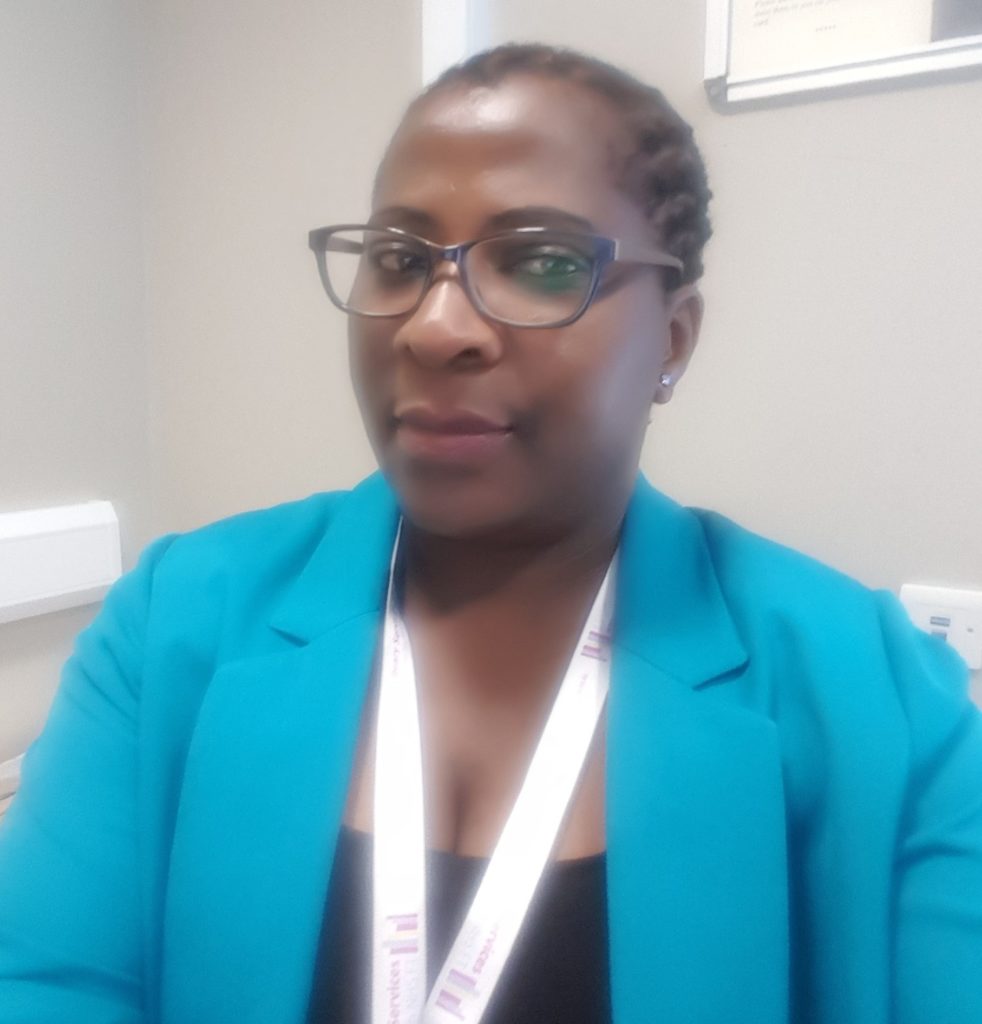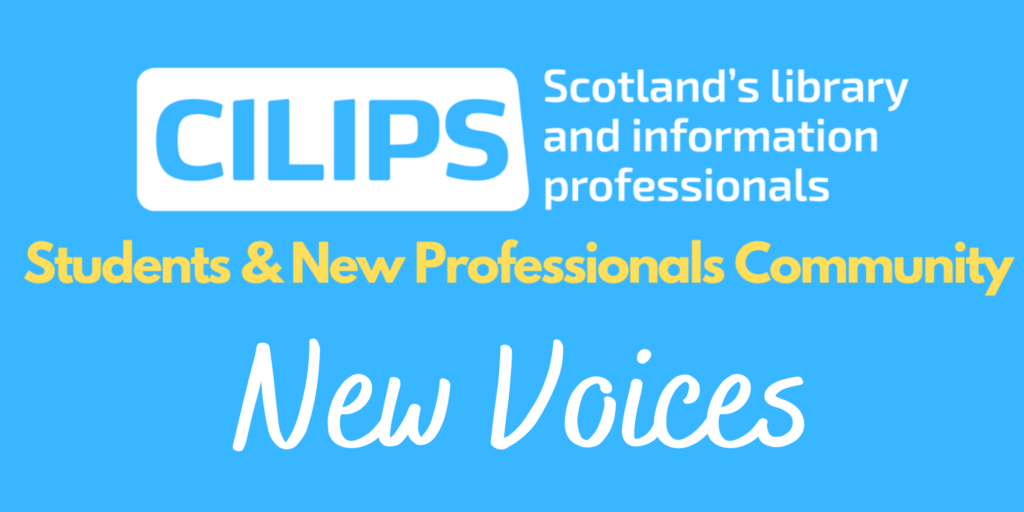New Voices RGU Student Series 2022 – Mpilo Siwela
Category: Blog, New Voices, New Voices, RGU Student Series 2022
In this 2022 Student Series for the New Voices blog, the CILIPS Students & New Professionals Community will be sharing the views of Robert Gordon University students from the MSc in Information and Library Studies. With special thanks to Dr Konstantina Martzoukou, Teaching Excellence Fellow and MSc Course Leader, for organising these fantastic contributions.
 Today, we hear from Mpilo Siwela (@mpilosiwela1), who is an Outreach/Reader Services Librarian at Oxford Health Libraries, as well as a student on the RGU MSc Information and Library Studies course.
Today, we hear from Mpilo Siwela (@mpilosiwela1), who is an Outreach/Reader Services Librarian at Oxford Health Libraries, as well as a student on the RGU MSc Information and Library Studies course.
Collaboration of nurse educators and information professionals in teaching evidence- based practice to nursing students.
1.1 Evidence-based practice and Information literacy
Information literacy is the ability to think critically and make balanced judgements about any information we find and use. It empowers us as citizens to develop informed views and to engage fully with society (CILIP, 2018). Health sciences librarians have been involved in the education of health staff and students on placement for many years, traditionally providing orientation to library resources or refreshers on literature searching and critical appraisal. With the increased focus on evidence-based medicine (EBM), health sciences librarians have found a natural partnership in teaching EBM search skills in the postgraduate curriculum (Bradley, 2010). Nurse educators have a vital role to mentor student nurses in relation to developing evidence-based practice (EBP) skills, accessing research products, and participating in research projects (Mthiyane and Habedi, 2018). Evidence-based medicine shares with librarianship the goal of applying the best scientific research toward the immediate, practical need to provide efficient, compassionate medical services to patients (Eldredge, 2000).
1.2 Information skills
Higher education learners have different levels of knowledge due to social, economic, political, cultural, age and ethnic backgrounds. According to Kolb (1984) everyone has a different learning style – some are divergers, assimilators, convergers, or accommodators – and with these different learning styles in place, the student nurses should be treated according to their individual information literacy needs. They need to be given a chance to work at their own pace to master information literacy skills that will support their personal development. It should not be assumed that all millennium students are digital natives, economic and political backgrounds may affect their access to technology.
Library Services are there to support nursing students with different levels of knowledge in finding evidence-based information through training them on how to conduct literature searches and critically appraise evidence. Evidence based practice requires research; research is an important part of being evidence-based and making good decisions (Koufogiannakis, 2011). A well-informed health worker making informed decisions thus results in safe and excellent care for patients. Nursing students need to select the best evidence (see Fig 1), which they can achieve using information skills learnt from the health sciences librarians and the clinical knowledge taught by the nurse educators. Students can acquire much of their knowledge from other resources as modern technology makes this increasingly possible and stimulating (Jenkins and Walker, 2013).
1.3 Why collaborate when teaching?
The teachers’ special abilities lie in designing learning activities, motivating and stimulating students in developing their learning skills, helping them to reflect and make meaning of their learning (Jenkins and Walker, 2013). Nurse educators are there to guide nursing students towards achieving their learning goals as individuals. Health Sciences Librarians, despite not having the teaching qualifications, have unique skills in teaching information literacy. Librarians are natural partners for this education and have key skills that can help both nursing educators and students become information literate and appreciate the role of research in daily practice (Schulte and Sherwill-Navarro, 2009).
The nursing students need these skills to retrieve the best information in order to achieve their learning goals. Information literacy sessions are tailored to meet individual needs as there is no ‘one-size-fits-all’. Nursing students possess different learning styles, so there is a need to use a variety of teaching methods and delivery styles (Cavanagh, Hogan & Ramgopal, 1995). Collaboration amongst those involved in education is vital to producing future nurses who are information literate and can apply this literacy in their daily practice (Schulte and Sherwill-Navarro, 2009).
1.4 Challenges
Both Health Sciences librarians and Nurse educators face the challenges of keeping up to date with new research and new technologies. They must be trained to adapt their instruction to the latest research-based methods and learn to work with a wide range of students’ achievement and interests.
Thank you to Mpilo for sharing this in-depth reflection on the vital importance of information literacy in healthcare and on the essential role that health library professionals play (find further case studies on this theme gathered as part of our #HealthLibrariansAddValue campaign).
Stay tuned for more in the 2022 New Voices RGU Student Series coming soon and be sure to check out the rest of CILIPS SNPC’s New Voices blog.
1.5 References
BRADLEY, D.R. et al., 2010. A centralized practice-based learning and improvement curriculum for residents and fellows: a collaboration of health sciences librarians, Journal of Medical Library Association, 98(2), pp. 175-178.
CAVANAGH, S. J., HOGAN, K. & RAMGOPAL, T., 1995. The assessment of student nurse learning styles using the Kolb Learning Styles Inventory. Nurse Education Today, 15(3), 177-183.
CILIP., 2018. CILIP Definition of Information Literacy. Information literacy group.
ELDREDGE, J.D., 2000. Evidence-based librarianship an overview, Bulletin of Medical Library Association, 88(4), pp. 289-302.
KOLB, D., 1984. Experiential Learning: Experience as the source of learning and development. New Jersey: Prentice Hall.
KOUFOGIANNAKIS, D., 2011. Considering the place of practice-based evidence with evidence based library and information practice (EBLIP), Library and Information Research, 35(111) pp. 41-58.
MTHIYANE, G.N. and HABEDI, D.S., 2018. The experiences of nurse educators in implementing evidence-based practice in teaching and learning, Health SA Gesondheid 23(0) pp 1-9. https://doi.org/10.4102/ hsag.v23i0.1177
SCHULTE, STEPHANIE J. and SHERWILL-NAVARRO, PAMELA J.,2009. Nursing educators’ perceptions of collaboration with librarians, J Med Libr Assoc 97(1) pp. 57-60.

